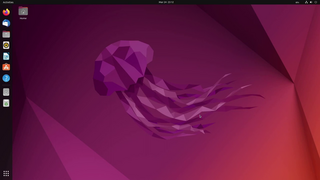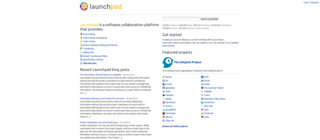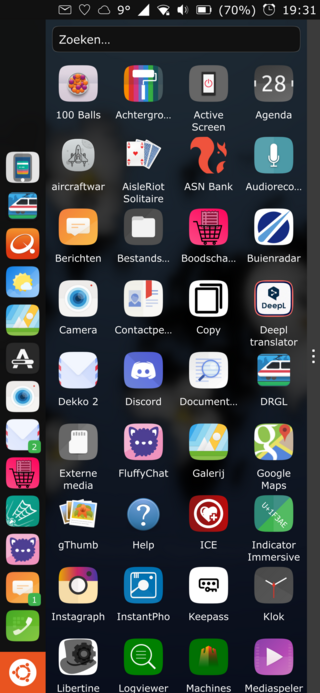
Rhythmbox is a free and open-source audio player software, tag editor and music organizer for digital audio files on Linux and Unix-like systems.
Single sign-on (SSO) is an authentication scheme that allows a user to log in with a single ID to any of several related, yet independent, software systems.

Ubuntu is a Linux distribution based on Debian and composed mostly of free and open-source software. Ubuntu is officially released in multiple editions: Desktop, Server, and Core for Internet of things devices and robots. The operating system is developed by the British company Canonical, and a community of other developers, under a meritocratic governance model. As of October 2023, the most-recent release is 23.10, and the current long-term support release is 22.04.
The Central Authentication Service (CAS) is a single sign-on protocol for the web. Its purpose is to permit a user to access multiple applications while providing their credentials only once. It also allows web applications to authenticate users without gaining access to a user's security credentials, such as a password. The name CAS also refers to a software package that implements this protocol.

Canonical Ltd. is a UK-based privately held computer software company founded and funded by South African entrepreneur Mark Shuttleworth to market commercial support and related services for Ubuntu and related projects. Canonical employs staff in more than 70 countries and maintains offices in London, Austin, Boston, Shanghai, Beijing, Taipei, Tokyo and the Isle of Man.

OpenID is an open standard and decentralized authentication protocol promoted by the non-profit OpenID Foundation. It allows users to be authenticated by co-operating sites using a third-party identity provider (IDP) service, eliminating the need for webmasters to provide their own ad hoc login systems, and allowing users to log in to multiple unrelated websites without having to have a separate identity and password for each. Users create accounts by selecting an OpenID identity provider, and then use those accounts to sign on to any website that accepts OpenID authentication. Several large organizations either issue or accept OpenIDs on their websites.

Launchpad is a web application and website that allows users to develop and maintain software, particularly open-source software. It is developed and maintained by Canonical Ltd.

Compiz is a compositing window manager for the X Window System, using 3D graphics hardware to create fast compositing desktop effects for window management. Effects, such as a minimization animation or a cube workspace, are implemented as loadable plugins. Because it conforms to the ICCCM conventions, Compiz can be used as a substitute for the default Mutter or Metacity, when using GNOME Panel, or KWin in KDE Plasma Workspaces. Internally Compiz uses the OpenGL library as the interface to the graphics hardware.

GNU Bazaar is a distributed and client–server revision control system sponsored by Canonical.

CNR, or One-Click & Run, was a free one-click software delivery service that was created to make finding and installing Linux software easier. It assisted the user in finding and installing software on their computer, and sat dormant in the system tray when not in use.
In FOSS development communities, a forge is a web-based collaborative software platform for both developing and sharing computer applications.

EasyPeasy was a Linux-based operating system for netbooks. EasyPeasy was built upon Debian and Ubuntu, but was customized for low-powered computers and access to web applications. EasyPeasy is maintained as an open source project, though it primarily uses popular web applications or proprietary software over free and open source software alternatives when the functionality offered is deemed better by its users.

Ubuntu One is an OpenID-based single sign-on service operated by Canonical Ltd. to allow users to log onto many Canonical-owned Web sites. Until April 2014, Ubuntu One was also a file hosting service and music store that allowed users to store data "in the cloud".

Ubuntu Software Center, or simply Software Center, is a discontinued high-level graphical front end for the APT/dpkg package management system. It is free software written in Python, PyGTK/PyGObject based on GTK.

OpenAM is an open-source access management, entitlements and federation server platform. Now it is supported by Open Identity Platform Community.
SAP Logon Tickets represent user credentials in SAP systems. When enabled, users can access multiple SAP applications and services through SAP GUI and web browsers without further username and password inputs from the user. SAP Logon Tickets can also be a vehicle for enabling single sign-on across SAP boundaries; in some cases, logon tickets can be used to authenticate into 3rd party applications such as Microsoft-based web applications.
Security Assertion Markup Language (SAML) is a set of specifications that encompasses the XML-format for security tokens containing assertions to pass information about a user and protocols and profiles to implement authentication and authorization scenarios. This article has a focus on software and services in the category of identity management infrastructure, which enable building Web-SSO solutions using the SAML protocol in an interoperable fashion. Software and services that are only SAML-enabled do not go here.

Juju is a free and open source application modeling tool developed by Canonical Ltd. Juju is an application management system. It was built to reduce the operation overhead of software by facilitating, deploying, configuring, scaling, integrating, and performing operational tasks on public and private cloud services along with bare-metal servers and local container-based deployments.

Ubuntu Touch is a mobile version of the Ubuntu operating system, being developed by the UBports community. Its user interface is written in Qt, and is designed primarily for touchscreen mobile devices such as smartphones and tablet computers, but the original goal of convergence was intended to bring Ubuntu Touch to laptops, desktops, IOT devices and TVs for a complete unified user experience.

Accounts & SSO, accounts-sso, or lately gSSO is a single sign-on framework for computers.














